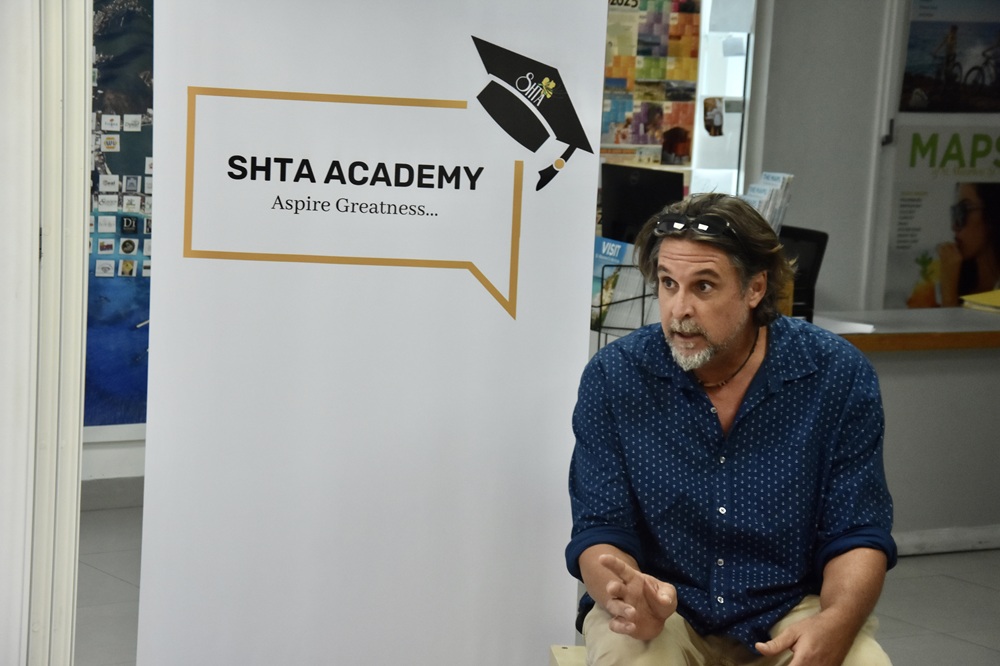Advertisement

By Tom Clifford
The island’s largest private business representative body issued a stark warning that the economic situation would become “more dire” unless urgent reforms, specifically value added tax, are initiated.
The Employer Council St Maarten also claimed that “the current economic trajectory is not sustainable.’’
Scheduling a media release for Halloween is fraught with danger but whenever the council’s views on the economy were publicised it would have had a sufficient alarm factor. The council is made up of the St. Maarten Hospitality & Trade Association, the St. Maarten Timeshare Association, the St. Maarten Marine & Trade Association and the Indian Merchants Association.
Addressing the media and key figures in the tourism sector, Paul Henriquez, president of the St Maarten Hospitality and Trade Association (SHTA), also questioned the validity of government statistics.
Henriquez claimed that independent assessments suggest that fewer tourists arrived on the Dutch Side than official numbers state. Since tourism is the main engine of the economy, inaccurate estimates will see that engine splutter and seize.
In some ways he admitted this comes with the territory, literally. “A tourist who arrives on the Dutch side and then goes onto another destination and then departs via the Dutch side,’’ can sometimes be twice classified as a visitor when in actual fact they are in transit.
But nonetheless a pretty good account can be made of real visitor numbers, he said.
Official figures for Dutch Sint Maarten are significantly overstated, he argued. This has been backed up, he said, by independent research into hotel occupancy and an analysis of foreign credit card usage.
“Our economic output is (tourism) export driven,’’ he said. “If arrivals are overestimated, in all likelihood export/output will be overestimated and as such GDP will be overestimated,’’ he added.
“An overestimation of GDP has policy consequences. Debt to GDP and tax to GDP will seem lower than they really are, creating policy challenges.’’
The Employer Council previously reported that tourism expenditure on the Dutch side of the island may be padded up.
The Central Bank of Curacao and St Maarten has, the association claims, over-reported travel exports (tourist spending) by 800 million XCG (385 million euro). This works out at about 18,000 XCG per resident.
“If that 800 million XCG is not produced, that means less jobs, less income, less funds for investments, less taxes and social security fees. In short, it means less economic activity,’’ the council said.
Members of the council were also in attendance at the media conference in the SHTA’s Philipsburg headquarters. The council is made up of representatives who oversee the majority of the island’s economic output.
“The core of the argument,’’ Henriquez added, “was that there are people who say the economy is doing great. It is not doing great.’’
Henriquez said one way to tackle the problem would see the introduction of VAT.
He admits that introducing a VAT rate of say 13 percent would not be popular but says the options are limited.
It would be better, he adds, “to broaden the base by shifting from direct to indirect taxation, i.e. from taxing wages and income to taxing consumption’’.
The principal indirect tax in St. Maarten is Turnover Tax or TOT, with a standard rate of 5 percent on realized revenues. Each transaction along the purchase chain is taxed.
It is not the same as VAT, a consumption levy assessed on the value added in each production stage of a good or service. Every business along the value chain receives a tax credit for the VAT already paid. The end consumer does not, making it a tax on final consumption. If the potential consumer does not buy, then they do not pay tax. Some favour this tax as there is an implied choice. The more you spend or consume, the more VAT you pay. But certain products have to be purchased regardless of income, such as food and clothing. Charging VAT on these items can be controversial.
Underlining the urgency of the economic predicament, the council warned that “the longer we wait the more dire the situation will become.’’
###
Recent articles by Tom Clifford:
A Tale of Two Cities: Marigot and Philipsburg
Interview with the Tech Hub Troubleshooter
###
ADVERTISEMENT







